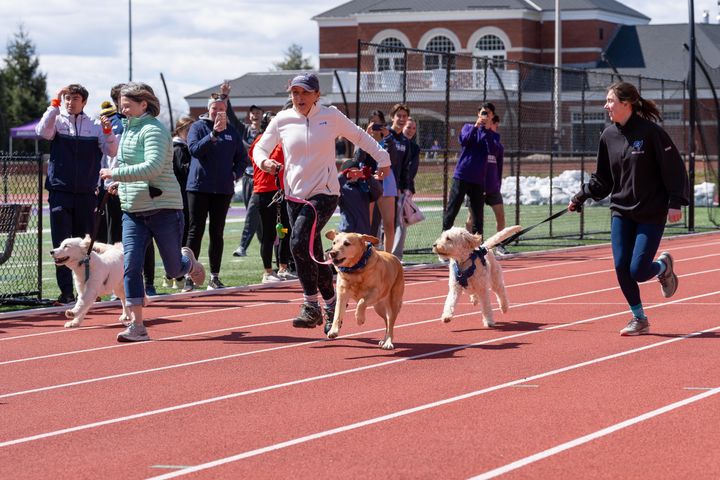Anti-Ableist Amherst: Sexual Victimization and Disability
Managing Opinion Editor Willow Delp ’26 calls attention to the outsized sexual violence faced by disabled people.
Content warning: This article discusses sexual violence.
This April marks the 23rd anniversary of Sexual Assault Awareness Month. On college campuses — including Amherst’s — sexual assault awareness is of utmost importance in creating a safer environment for survivors: students between the ages of 18 and 24 experience high rates of sexual violence, and sexual assault at college makes up a significant percentage (43 percent) of crimes. Due to various factors, such as survivors’ shame and fear of not being believed, sexual assault on college campuses is also incredibly underreported
It is important, within this context, to recognize that marginalized populations — including disabled people — often suffer sexual assault at disproportionate rates. Rapists often exploit the more vulnerable status of marginalized people in order to harm them without suffering consequences. One way that this shows up is the systemic sexual victimization of disabled people. (I use the broad term “sexual victimization” to encapsulate both sexual assault and sexual harassment.)
Sexual victimization, as a host of sources have definitively demonstrated, is significantly higher among disabled people than abled people. The Maryland Coalition Against Sexual Assault has labeled the problem a “silent epidemic.” Eighty-three percent of disabled women will be sexually assaulted within their lifetime.
Sexual victimization against disabled people is palpable on college campuses, where 31.6 percent of undergraduate disabled women have experienced sexual assault that involves force or incapacitation (compared to 18.4 percent of abled undergraduate women.) Disabled students are six times less likely to report their experiences. Disabled people experience numerous barriers to reporting, such as ableist stigma that stereotypes disabled people as less credible and not sexually desirable and the reliance many disabled people have on a sexually abusive caregiver or doctor. As Azura Rose, a disabled survivor, told Teen Vogue, “I frequently have to put up with medical professionals touching me when I’d rather they didn’t … And given that they were access to life-saving care, I didn’t have much choice to fight back.”
This issue continues throughout working disabled people’s career trajectory: Nearly half of women with disabilities (48 percent) have experienced sexual victimization in the workplace, compared to about a third (32 percent) of abled women. Disabled men, compared to abled men, also experience elevated rates of sexual victimization: with 23 percent of disabled men experiencing sexual victimization, compared to 11 percent of abled men.
Since April is also Autism Acceptance Month, the rates of sexual victimization against autistic people are especially worth examining this month. Caregivers of autistic children reported that 16.6 percent of autistic children have experienced sexual abuse. (It is entirely possible that sexual victimization is underrepresented, as it asks caregivers, who may not be aware of abuse their child has suffered.) Autistic adults also report higher rates of sexual victimization — one study shows that 75.4 percent of autistic adults have faced sexual harassment and 56.8 percent have faced sexual violence. Additionally, autistic people often experience sexual victimization multiple times. In the words of Sarah Douglas, an autistic survivor of sexual assault, she was “primed to be passive,” as she had to people-please in order to fit in with neurotypical people. “For a lot of autistic people, this is kind of normal,” she said.
Other reasons autistic people suffer high rates of sexual assault include lack of sex education (as autistic youth are often not provided accessible sex education from caregivers or schools) and autistic people’s struggle to understand appropriate social boundaries. With communication difficulties, autistic people can struggle to report sexual victimization — an issue that is especially pronounced for nonverbal autistic people. Autistic people may also not pick up on cues that someone is trying to manipulate them.
According to Boston University professor Emily Rothman, autistic survivors are “not sure where to turn or how to get help or how to feel better… [A]ll of our systems on college campuses and in the world are set up to help non-autistic people.” She has helped develop a module called Autism Training for Sexual Assault Counselors to meet this need.
Despite the pervasive threat of sexual victimization disabled people face, an awareness of disabled people as a distinctly marginalized population is largely absent from Amherst’s consciousness. Amherst lacks a major or certificate program in disability studies, and a formalized disability resource center is conspicuously absent from Keefe Campus Center. First, we must acknowledge the specific needs of disabled survivors at Amherst — beyond bare-bones legally mandated accommodations. Then can we begin to build a world in which all disabled people are not exploited, but respected for the fullness of their humanity.





Comments ()